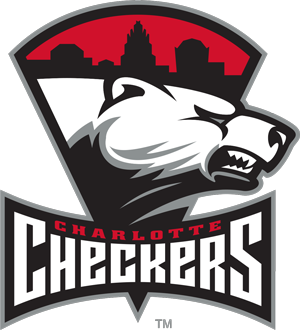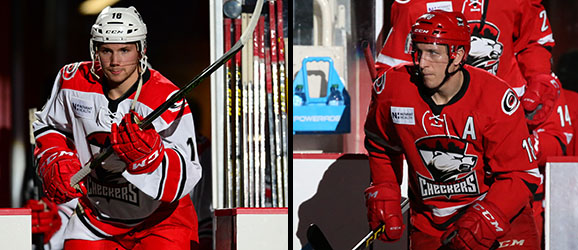Heading into the 2015-16 season, no player on the Checkers generated more buzz than Sergey Tolchinsky.
A phenom in the OHL, he had made a name for himself with a bank of highlight reel plays propelled by his blistering quickness and jaw-dropping stickhandling skills. But making the jump to the pro level can be a tough adjustment for any caliber player.
Tolchinsky roared out of the gates, putting up five points in the first four games of the season, but began to hit some bumps as the campaign continued. He found himself up and down the lineup as he worked to get a grasp on the pro-style that Mark Morris, who served as head coach last season before accepting the same role at St. Lawrence University earlier this week, was implementing.
“We’re making some progress with Sergey,” said Morris after a practice in early December. “He’s a little stubborn at times, but he’s a good kid. When someone struggles at understanding, you hope that they’re receptive to the ideas that you have. In his case, it’s been a longer process and I know it frustrates him that he hasn’t seen more minutes, but all that time is earned.”
On top of trying to tackle the pro game on the ice, Tolchinsky was navigating through those adjustments off the ice as well.
That’s where some veteran leadership stepped up. While Tolchinsky was quick to credit all of his teammates (“We have a good team, all the guys are good guys. Everyone was really nice to me from the start. It wasn’t a problem to fit in on the team”), there was one in particular who took a vested interest.
“We sit beside each other in the locker room and everywhere on the road,” said alternate captain Kyle Hagel. “I feel like early on in the year I had to coax him and be nice to him sometimes in order to let him know that I care about him and I’m here to be his teammate and not just hammer down on him.”
Hagel, a veteran leader in his second season with the Checkers, made it a point to take the rookie under his wing help him with that transition.
“I remember I took a picture of his stall because he had left his stall a mess one time, and I was like ‘Hey man, this is what your stall looks like, you should probably clean it up’ and sent it to him,” said Hagel. “And he responded ‘Ok sorry, my fault, I’ll take care of that tomorrow’. There was one or two times where I had to kind of snap on him to make sure that he’s in the weight room working out and making sure that he’s showing the organization that he’s making a commitment to be better. And to his credit, there were a couple of times I had to do that, but he took it to heart. He was in the weight room after every game working on stuff and trying to get better and show that he cares.”
And, according to Hagel, those lessons made a big impression.
“When a guy listens and shows respect to the older guys in the room, again, it endears him to his teammates. He definitely wasn’t some type of uncoachable kid. He’s a good kid. I like him.”
Tolchinsky also flipped a switch on the ice, embracing Morris’ demands of becoming a two-way player and finding the back of the net more frequently as the season rolled on.
“I think that for Russian players, there gets to be a spot where they get it,” said Hagel. “If you read that Players Tribune article that [Evgeny] Kuznetsov wrote earlier this year, he talked about when he first got here, they just see hockey in a different way, like it’s a skill game and they want to make individually fantastic plays. Kuznetsov finally came to the realization that winning is actually going to be more important. I think that you saw, especially in the last half of the year, Sergey making more selfless decisions, which is great.”
Tolchinsky himself was able to see the boost in his game as he started to grow more acclimated to the new style of play.
“I learned how to play better defensively and how to manage my risks better,” said Tolchinsky. “I think I matured. I was starting to make better plays and was playing more for the team and not turning the puck over so much.
“It took me a while, like maybe half the season, to actually start playing and showing my game. And then when I figured it out I still had a lot of up and downs over the season. It wasn’t really consistent, it was a couple games good then a couple games bad. I think in the last two months I found my game and started playing good and getting points.”
Having a positive influence like Hagel seemed to play a big role in Tolchinsky’s successful rookie campaign.
“He’s a great teammate,” said Tolchinsky. “He has great character and he helped me a lot during the whole season, like telling me stuff and helping me in the room. He taught me a lot of things and when I was having a rough time he was supportive. He had a huge part for me during the whole season. And not just me, the whole team. He’s one of the biggest supporters on the team.”
With 36 points on the season, the third-highest total by a rookie in franchise history, and his NHL debut all under his belt, Tolchinsky seems to have navigated those rough waters as he heads into his sophomore campaign.
“I think Sergey came leaps and bounds this year,” said Hagel. “I’m really proud of the way he played, especially in the second half of the year. He just started to become a lot better teammate down the stretch. What he showed in the second half of the year is that he has the potential to play up there. I think that he’s got a really bright future ahead of him.”
As he continues to grow as a pro, the bond that Tolchinsky and Hagel forged is something that could stick with the young forward from here on out.
“Sometimes that big brother attitude is something that is going to resonate with a player,” said Morris. “I often tell people, I learned way more from my teammates than I did from any coach, and there’s a lot of truth to that. Guys that lead by example and guys that maybe tweak you from time to time to keep you on the right track are the guys that you’re going to remember for the rest of your life. You may not always hear the things you want to hear from those guys you look up to, but you’re going to remember everything they say. When they’re some of the hardest workers on the team, it’s easy to follow suit.”






